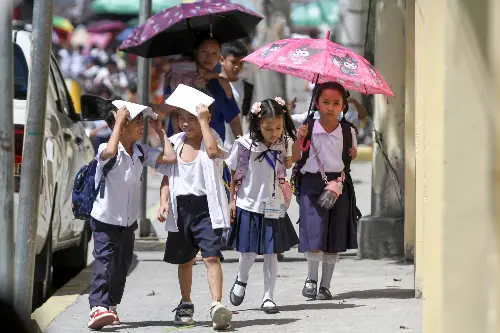
MANILA, Philippines – It’s that time of year again when classes are disrupted due to extreme heat.
While the Department of Education (DepEd) has been gradually returning to the old academic calendar, the current school year 2024-2025 won’t end until April 15.
Since Monday, March 3, several local government units (LGUs) have been suspending classes in anticipation of high heat index levels throughout the day. The heat index is calculated using the air temperature and relative humidity, reflecting the temperature that the human body perceives, or the “feels-like” temperature.
The weather is only expected to get hotter as the Philippines approaches the warm and dry season, which typically lasts from mid-March to May.
The Philippine Atmospheric, Geophysical, and Astronomical Services Administration said “dangerous” heat index levels ranging from 42°C to 51°C are expected in various parts of the country in the coming weeks.
When to suspend classes
In a text message to Rappler on Wednesday, March 5, Education Secretary Sonny Angara said the DepEd has reminded schools to implement Department Order No. 22, which outlines guidelines for class suspensions during disasters and emergencies.
Under the department order, issued in December 2024, there is no automatic class suspension due to extreme heat. Instead, LGUs can suspend classes for their areas, provided that schools will shift to modular distance learning, performance tasks, projects, or make-up classes.
If there is no declaration from the LGU, the DepEd’s policy allows school heads to suspend in-person classes if excessive heat poses health risks to students and teachers.
The DepEd advised schools to switch to distance learning when the heat index reaches 42°C or higher.
But shifting to remote learning won’t be easy, as not everyone has access to the technology needed for virtual classes. DepEd data from October 2024 revealed that “only 37% of teachers have laptops, and just 17% of students have access to the devices required for online learning.”
While printed learning modules can be used, not all students have someone to guide them or facilitate learning at home. In some cases, it is the parents who complete the modules, rather than the students themselves. (READ: Parents bear the brunt of distance learning as classes shift online)
Other measures
Angara also mentioned that he has instructed field offices and schools to take other preventive measures, such as adjusting class schedules, ensuring access to drinking water, and improving classroom ventilation.
Schools are advised to hold morning sessions from 6 am to 10 am, allow asynchronous learning from 10 am to 2 pm, and conduct afternoon sessions from 2 pm to 6 pm.
Additional rest and hydration breaks are encouraged, particularly in non-air-conditioned classrooms.
The DepEd also instructed schools to provide additional electric fans. (READ: Tulfo blasts DepEd: Why collect contributions from students for electric fans?) – Rappler.com
